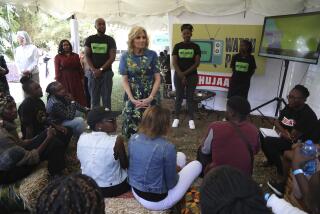Kenya Boosts Condom Imports
- Share via
NAIROBI, Kenya — Seven hundred people die every day from AIDS in Kenya, where President Daniel Arap Moi says he is embarrassed to talk about condoms and advises people to just avoid sex. But some of his constituents are eager to learn more about the little latex things that could save their lives.
“I think the president is embarrassed because it has come to such a point that the government has to allocate billions of shillings to import condoms, and it is no longer an issue of morals but a matter of life and death,” said Sylvia Maina, a 22-year-old university student.
Maina was referring to the government’s plans to import 300 million condoms, part of a campaign to control the rapid increase in AIDS-related deaths.
Speaking Wednesday before the country’s Pharmaceutical Society, the 76-year-old Moi said he felt “shy” to have to speak publicly about condoms and AIDS, about the need to have to import condoms at all. He urged Kenyans to go without sex for two years.
Unlike Uganda, which runs an aggressive, successful AIDS-awareness program that includes a lot of frank talk about condoms and sex, Kenya has been slow to face up to the reality of the disease.
Faced with more than 2 million HIV-positive Kenyans and half the beds in government hospitals occupied by AIDS patients, Moi two years ago finally declared AIDS a national emergency.
But despite the Kiswahili condom jingle that urges Kenyans to “Sema Nami” or “Let’s Talk” about AIDS, most of the pages upon pages of death notices in the daily newspapers refer only to a “short,” a “long,” or a “mysterious” illness as the cause of the many AIDS-related deaths.
Meanwhile, the Roman Catholic church and some opposition leaders denounced the condom proposal.
The cash-strapped Kenyan government, crippled by a long economic decline, will not be footing the bill right away. The World Bank is giving Kenya “soft” loans, or loans with low interest that don’t have to be paid back for decades. The loans, totaling $100 million, will pay for some 300 million condoms over a four-year period, according to Dr. Kenneth Chebet, head of the AIDS control unit in the Ministry of Health.
“It is a good thing; it’s probably the only way out now,” said Bernard Muthaka, who works for Population Services International, a Washington, D.C.-based nongovernmental organization that imports and distributes subsidized “Trust” condoms.
The group has recorded a 10% annual increase in condom imports to Kenya over the last five years to 13.2 million this year, he said. A package of three costs 8 cents. More than half the people in Kenya live on less than 50 cents a day.
Caroline Njuguna, a 22-year-old secretary, expressed concern that most of the AIDS-awareness programs in Kenya are concentrated in Nairobi and need to focus on rural areas where the majority of the nation’s 29 million people live.
A year ago, Condomi, a German-based condom manufacturer, announced plans to build a factory in Kenya that could have produced millions of condoms. But discouraged by government red tape and lack of responsiveness, the company moved its project to South Africa.
If the project succeeds in South Africa, the company plans to export to other African countries, said Condomi spokesman Frank Tillmans. Africa needs 7 billion condoms a year, he said.
Political activist Wafula Buke, 38, believes that talk alone about condoms will not reduce the rate of HIV infection.
“It was not just a question of awareness in Uganda . . . that made Uganda’s AIDS program a success,” he said. “This was the same time that the Ugandan economy was picking up, and the government was committed to the revival. There was a sense of purpose. With a purpose, you will have a reason to live.”
More to Read
Sign up for Essential California
The most important California stories and recommendations in your inbox every morning.
You may occasionally receive promotional content from the Los Angeles Times.













